|
6/13/2015 Comments Hello Christian HegemonyBy: Joanna Shenk 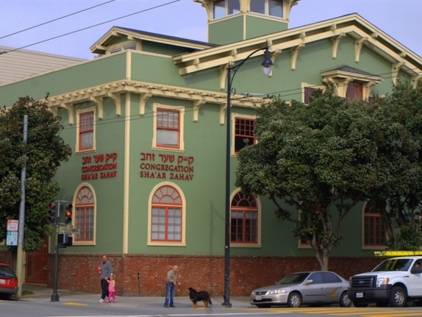 Congregation Sha’ar Zahav where First Mennonite Church of San Francisco meets on Sunday morning Credit: Joanna Shenk Congregation Sha’ar Zahav where First Mennonite Church of San Francisco meets on Sunday morning Credit: Joanna Shenk Note: This article originally appeared at Geez Magazine I became a pastor recently, which wasn’t the easiest decision. You see, my dad and my grandpa were both pastors. I was steeped in church growing up, always the first there and the last to leave. I didn’t like the expectation of being a good pastor’s kid and rebelled against that image in various ways as a youngster. As an adult, I didn’t want to be perceived as unreflectively joining the “family business” or being religiously narrow in a world that has been oppressed by Christianity for centuries. When I went to seminary it wasn’t to become a pastor, but rather to work through my theological questions. Definitely some privilege involved in going to graduate school for personal development reasons. And it was a deeply transformative time of reorienting my gaze to see the systemic realities in our world. In addition to not feeling a pastoral call in seminary, I also wasn’t sure if wanted to be a Christian. And even though I was at Anabaptist Mennonite Biblical Seminary, I also did not identify as Mennonite when I started.
Comments
By: Jarrod Cochran JarrodCochran 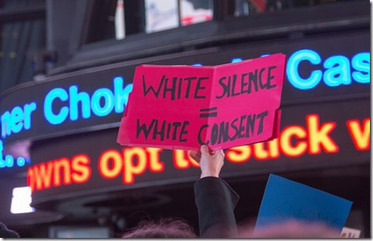 I was driving home from work when I heard about the eruption of protests in Baltimore over the death of 25 year-old Freddie Gray while in police custody. As I began to get a barrage of texts and posts on social media about the riots, I chewed it over in my mind and came up with something I felt was extremely eloquent to write about it. After I arrived home, I forgot those expressive words and stared at my blank computer screen. I began to give up and close the laptop thinking, "If you don't have something important to say, don't just run your mouth." That thought process sounds "right" on the surface. However, if we dig a little deeper, we see an ugly root. It is the Church's silence on the things that matter that has allowed so much ugliness in the forms violence, war, oppression, prejudice—all borne out of hatred and fear—to become manifest. Use your words. Use your body. Get in the way of violence and injustice. Take a stand. Just because you do not have the writing or oratory skills of Thoreau or Lucy Parsons does not mean that what you say matters less. Simply declaring that what is occurring in the world is wrong and taking a stand to make it right means more than a million good and eloquent intentions that never produced an action. When we are silent on the things that matter, we have already sided with the oppressor. It is with this understanding that I write to you now. 4/29/2015 Comments Standing Amidst the Wrath of GodBy: Nichola Torbett 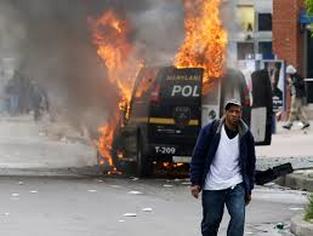 The wrath of God has been kindled and is pouring out of Baltimore in images of police cars on fire and CVS windows broken. It pours out of Baltimore as it poured out of Ferguson last summer. In the faces of chanting protestors there, I see the power of the life force refusing to be repressed any longer. The life of God is rising up and destroying the instruments of oppression like so many drowned Egyptian chariots. Praise God. Praise God, but I think if we’re honest, it makes a lot of us American Christians, and especially white American Christians like me, uncomfortable. And if ever we needed to be honest, it is now. In predominantly white progressive Christian circles, we are squeamish about this concept: the wrath of God. For instance, I have always wanted to celebrate the escape of the Hebrew slaves from Egypt while glossing over the drowning of the Egyptian soldiers in the Red Sea. After all, the Egyptian soldiers were people, too. Didn’t God care about them? Note: This article was originally posted on Women in Theology and is the second in a three part series. “The credit economy is a network of contracted servitude. … Whenever one spends money, one spends a portion of the substance, wealth and life of those who have undertaken loans. Yet the value of money is also backed by profitability, including the drudge of labour in sweatshops and factories, the exclusion from the formal economy of those who are not employed profitably, the consumption of natural resources and the erosion of ecosystems and societies. The value of money is still paid for in flesh and blood.” (Philip Goodchild, Theology of Money, 239) By: Nichola Torbett 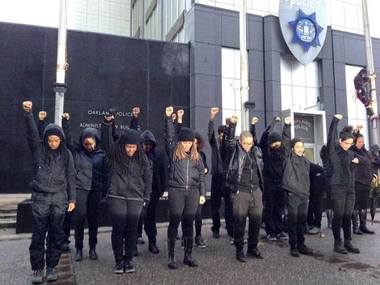 Group calling themselves "Black and Breathing" lead an action which shut down the Oakland Police Department for four hours 28 minutes. Photo Credit: Wazi Davis Group calling themselves "Black and Breathing" lead an action which shut down the Oakland Police Department for four hours 28 minutes. Photo Credit: Wazi Davis During the summer between third and fourth grade, I moved with my mom and sister into a new school district. In my new fourth grade classroom that fall, one student was designated each day to take the attendance slip from the teacher, leave the room, and…do something. All I knew is that the chosen one would come back a few minutes later without the little pink slip. After a few weeks, my turn came. I took the little pink slip, walked out the door as I had seen other kids do, and had no idea what to do. Now, at this point, you may be wondering why I didn’t just ask the teacher where I was supposed to go with it. That is exactly what another teacher asked me when she found me wandering the halls in tears several minutes later. I didn’t have an answer then, but looking back, I can see that by the age of nine, I had already figured out that I was supposed to know things, that knowledge was not only power but protection from being taken advantage of. To this day, it is hard for me to ask for directions. In unfamiliar neighborhoods, I duck into alleys so that no one will see me consult the map, and I am adept at reading subway maps surreptitiously out of the corner of my eye. When someone gives me information, I am always tempted to tell them that I already knew that. Being a knower feels safe to me, and yet I am coming to see that, like so many other forms of safety and invulnerability, being a knower is a trap. It’s a trap especially for me as a white cis-gendered person with middle class connections and especially when it comes to Kingdom justice. Let me explain. 11/15/2013 Comments Distress of the PrivilegedBy: Doug Muder Editors Note: This essay originally appeared at The Weekly Sift
In a memorable scene from the 1998 film Pleasantville (in which two 1998 teen-agers are transported into the black-and-white world of a 1950s TV show), the father of the TV-perfect Parker family returns from work and says the magic words “Honey, I’m home!”, expecting them to conjure up a smiling wife, adorable children, and dinner on the table. This time, though, it doesn’t work. No wife, no kids, no food. Confused, he repeats the invocation, as if he must have said it wrong. After searching the house, he wanders out into the rain and plaintively questions this strangely malfunctioning Universe: “Where’s my dinner?” 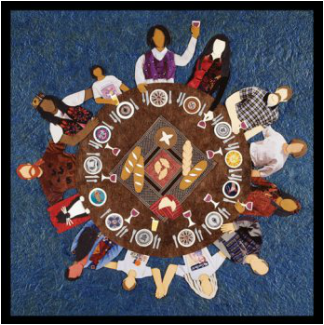 There are many models for uprooting oppression in our communities. To offer one of many, the Hosanna! People’s Seminary approach is to discern particular areas of privilege and poverty within a community through a three part process: awareness of privilege and oppression in the community; accountability in the community to the oppressed party and to the continued education and development of the privileged party through ally training; and solidarity in relationship with the oppressed party or those allying with the oppressed party outside of the community. For example, a group committed to rooting out ableism in their community and work would first grow in awareness of any ability-based disparities in privilege in the circle. To assist them in this task, they may seek out the help of an anti-oppression trainer, a trusted advisor, or a tool such as an accessibility audit.
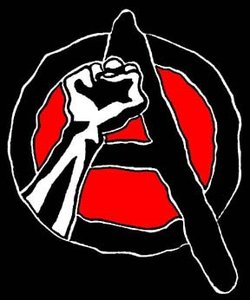 (Or, I hope it is because we are all recovering hierarchists trying to find another way forward) Editor’s Note: This piece is part two of a series of call and response between Amaryah Armstrong and Nekeisha Alexis-Baker as they consider what possibilities Christian anarchy can provide for marginalized peoples. The conversation grows out of friendship and mutual respect for each other, and from our commitments to living lives of liberation. We aim for to be an ongoing dialogue that builds on each call and response. As a result, we strongly encourage you to begin at the beginning and follow along from there. You can read part one from Amaryah here. Many things came to mind as I reflected on your questions—some of which I still ask myself almost a decade after unwittingly co-creating this thing we call Jesus Radicals. I had to smile at the “Black Queer Feminist with anarchist impulses” identity you’ve adopted because it reminded me of when I called myself “a Christian with anarchist tendencies” as I sorted out whether anarchism was for me. 10/28/2011 Comments Confessing Pacifism, Repenting in LoveBy: Nichola Torbett 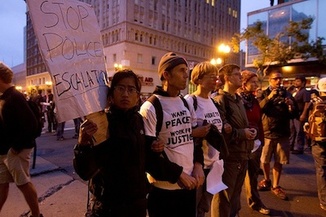 A few weeks ago, I wrote a piece for this website that called for a confessing movement. Consider this my first confession, inspired largely by my participation in Occupy Oakland. Until recently, I have been what one of friends calls a “nonviolence fundamentalist.” Inspired by the movements of Mahatma Gandhi and Martin Luther King, Jr., among others, I have had a deep intuitive sense that our means of social change must be consonant with the ends we wish to achieve. If it is not just a reversal of oppressions that we seek to achieve but a real reign of love, then we must get there without straying from love. I believe this is also the message of the gospel, in which Jesus of Nazareth maintained his commitment to love, manifest in nonviolence, all the way to the cross and beyond, initiating a Reign of Love that is somehow both “at hand” now and yet not fully here, and by the tenants of which I am, as a disciple of Jesus, called to live now, no matter the cost. In an attempt to live out that discipleship, I have chosen to engage in justice struggles only when those struggles have been predicated on a strong commitment to nonviolence; as a result, there have been many movements with which I have not engaged and which I have sometimes even critiqued. These include many led by low-income communities of color. As woman with white-skin privilege and middle-class connections, I must repent of that now. 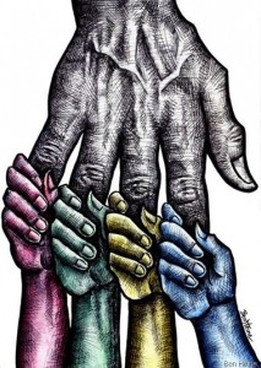 Editor’s Note: In part one of this series, Dan Oudshoorn suggested the ease with which Christian communities become flawed, self-congratulatory groups that still look like the middle-class status quo. In this part of the series, Dan challenges the shallow (at best) and colonial (at worst) attempts to relocate into the “bad part of town.” Any talk of Christian community must give priority to the question of what it means to move into more intimate forms of community with people who are marginalized, oppressed, and abandoned. This is not to say that every Christian community must be open to all these people—for example, in our community in Vancouver’s downtown eastside, we quickly realized that we couldn’t focus upon being a safe place for both the low-track female sex workers we met, and for a good many of the homeless men from the neighborhood—but prioritizing one population amongst those who have been abandoned is absolutely essential to developing intentional Christian communities. If, that is, these communities are to be more than self-serving entities that fill the void we have discovered in our own middle-class lives. Because the truth is that it is incredibly easy to establish a community that others will consider ‘radical’ and ‘inspiring’ but that, in actuality, does little or nothing for anybody apart from making those who live in that community feel good about themselves. I know this, because I experienced this. Granted, it wasn’t my intention to do so, but when I was living in Vancouver’s downtown eastside, I was constantly confronted by how easy it was to move into a poor neighborhood, engage in a few acts of hospitality (hosting sex workers for dinner, having strung-out kids stop by to come down from bad trips, allowing some people to crash on our couch) but, all in all, continue to live a life of distinctive privilege and near total insignificance . . . while simultaneously being treated as though I was some sort of Christian superstar. It would have been easy to buy into the hype I was receiving from others—and I know some who live in intentional community settings who have done this—so beware of the respect others will give you. At the very least, it’s a double-edged sword. Recall the ending of the movie, The Devil’s Advocate. If the devil doesn’t get us to serve his purposes through money, sex and power, he’ll get us to serve his purposes by congratulating us on how holy and good we are. |
Disclaimer
The viewpoints expressed in each reader-submitted article are the authors own, and not an “official Jesus Radicals” position. For more on our editorial policies, visit our submissions page. If you want to contact an author or you have questions, suggestions, or concerns, please contact us. CategoriesAll Accountability Advent Anarchism Animal Liberation Anthropocentrism Appropriation Biblical Exegesis Book Reviews Bread Capitalism Catholic Worker Christmas Civilization Community Complicity Confessing Cultural Hegemony Decolonization Direct Action Easter Economics Feminism Heteropatriarchy Immigration Imperialism Intersectionality Jesus Justice Lent Liberation Theology Love Mutual Liberation Nation-state Nonviolence Occupy Othering Pacifisim Peace Pedagogies Of Liberation Police Privilege Property Queer Racism Resistance Resurrection Sexuality Solidarity Speciesism Spiritual Practices Technology Temptation Veganism Violence War What We're Reading On . . . White Supremacy Zionism ContributorsNekeisha Alayna Alexis
Amaryah Armstrong Autumn Brown HH Brownsmith Jarrod Cochran Chelsea Collonge Keith Hebden Ric Hudgens Liza Minno Bloom Jocelyn Perry Eda Ruhiye Uca Joanna Shenk Nichola Torbett Mark VanSteenwyk Gregory Williams Archives
October 2017
|
Search by typing & pressing enter


 RSS Feed
RSS Feed